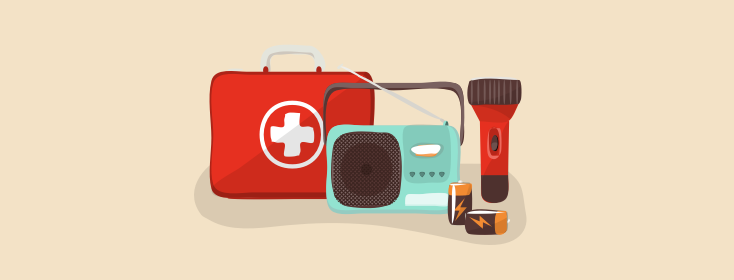Preparing for the Worst
On September 13, a 72-year-old disabled woman with multiple sclerosis lost her life in the California wildfire known as the Valley fire. She died because she was unable to leave her home unaided, and the fire, which moved with surreal speed, got to her before firefighters were able to reach her.
I don’t cry easily. But when I heard about her on the news the following evening, I did cry. All I could think of was how terrified she must have been, trapped in her home with no hope of escape as the fire burned her house down around her.
After I dried my tears, I wondered if she’d had any sort of support system in place? Did she have family members or friends who, like the firefighters, had tried and failed to reach her in time?
She did. The woman who helped her with groceries and chores around the house had offered to take her out just hours before the fire. But the fiercely independent Barbara McWilliams had declined, and neither of them knew at the time that the fire was anywhere close to her, let alone how quickly it would race to and engulf her relatively isolated home.
And then it was too late. Although they tried, firefighters and other first-responders were unable to reach her. It was no one’s fault, really. The fire had just moved too fast.
Since then, I’ve wondered how many other people there are out there who’re disabled and may be helpless in the face of a natural disaster. There must be tens of thousands across the U.S. and there is no place in the country that’s safe from such a tragedy.
Here in California, after four years of drought, wildfire is the biggest and most immediate threat in many communities. But fire was a threat before the drought, too. This state has always burned in the summer and fall. Of course, we have earthquakes, as well, but damaging quakes are far more rare than wildfires.
Thank goodness.
But California is not alone. Many places in the West, also stricken by drought, is threatened by fire or is already burning. Our neighbors to the north, Oregon and Washington, also share the earthquake threat. In the Midwest people face monster storms that bring devastating tornadoes and flooding rains. Along the Gulf and East coasts, people hunker down each fall wondering when and where the next killer hurricane or winter storm will hit. And in the midwest and northeast, winter brings monumental ice- and snowstorms that cut people off from each other and hobble emergency services for days at a time.
Not one of us has the luxury of being unaffected by the natural world we live in. Those of us with rheumatoid disease (or other disabling forms of arthritis or other illnesses) need to be extra careful that we have a good support system in place.
I’ve put together a list:
- Keep phone numbers for your friends and family handy (not just saved in your phone!), along with emergency contact information. If you think you might be in trouble, call 9-1-1.
- Make a plan. Know how you’ll leave your house or apartment building, and where you’ll go in case of an emergency.
- Make sure your cell phone is always charged up. You might consider keeping a land-line, too.
- Keep a battery powered, solar, or hand-cranked radio on hand.
- Make an effort to get to know your neighbors. Americans tend to isolate away from work these days, but making friends with neighbors means you might have someone as close as next door who’ll watch out for you and help in an emergency.
- Always keep at least three days worth of non-perishable, easy-to-prepare food and water (1 gallon per person per day) in the house in case you’re unable to get out.
- Have a manual can opener and bottle opener on hand.
- Buy storm candles.
- Buy matches or a couple of disposable lighters.
- Have a good, sturdy flashlight where you can find it--and where you can easily get to it.
- Keep a good supply of batteries of all sizes in the house.
- Have a seven-day supply of necessary medications, other medical supplies, and paperwork about any serious or on-going medical condition on hand.
- Buy a first-aid kit--and don’t use it for anything but an emergency. Keep it where you can get to it easily.
- Keep copies of important documents such as insurance cards, immunization records, etc. where you can find and get to them easily.
- Keep blankets where you can get to them.
- If you have pets, make sure there are collars, leashes, and crates for each of them. Keep an extra supply of food and water, and any medications they might need, on hand too.
If you’re reading this, I’m sure you have ideas about what might be smart to have on hand, as well. Above all, be ready. Pay attention to the news. Know what’s going on in your world. Here’s wishing everyone a safe, non-disastrous fall and winter.

Join the conversation